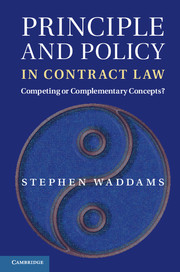Book contents
- Frontmatter
- Contents
- Table of Cases
- Preface
- 1 Introduction: empire of reason, or republic of common sense?
- 2 Intention, will and agreement
- 3 Promise, bargain and consideration
- 4 Unequal transactions
- 5 Mistake
- 6 Public policy
- 7 Enforcement
- 8 Conclusion: joint dominion of principle and policy
- Select Bibliography
- Index
- References
8 - Conclusion: joint dominion of principle and policy
Published online by Cambridge University Press: 07 September 2011
- Frontmatter
- Contents
- Table of Cases
- Preface
- 1 Introduction: empire of reason, or republic of common sense?
- 2 Intention, will and agreement
- 3 Promise, bargain and consideration
- 4 Unequal transactions
- 5 Mistake
- 6 Public policy
- 7 Enforcement
- 8 Conclusion: joint dominion of principle and policy
- Select Bibliography
- Index
- References
Summary
Comparisons have been made by English commentators at various times between English law and the systems based on Roman law, usually to the advantage of the civil law, which has often appeared to its English admirers to be better ordered, more elegant and more principled than English law. Such comparison was familiar in the seventeenth century, as appears from Sir Matthew Hale's preface to Rolle's Abridgment (1668). Hale defended English law against other systems on the ground of the greater precision of the former:
The Common-laws of England are more particular than other laws, and this, though it render them more numerous, less methodical, and takes up longer time for their study, yet it recompenseth with greater advantages, namely, it prevents arbitrariness in the Judge, and makes the law more certain…It hath therefore always been the wisdome and happiness of the English Government, not to rest in Generals, but to prevent arbitrariness and uncertainty by particular Laws, fitted almost to all particular occasions.
Critics of English law, Hale continued, objected to its lack of ordered classification, saying:
that it wants method, order, and apt distributions, and this hath bred some prejudice against it, not only in men much addicted to subtil learning, but also in the Professors of the Civil Law, who think that Law much more methodicall and orderly than the Common-law.
After a discussion of methods of resolving moral questions, Hale remarked, in defence of English law, ‘yet it were a vain thing to conclude it is irrational, because not to be demonstrated or deduced by Syllogismes’.
- Type
- Chapter
- Information
- Principle and Policy in Contract LawCompeting or Complementary Concepts?, pp. 209 - 230Publisher: Cambridge University PressPrint publication year: 2011



